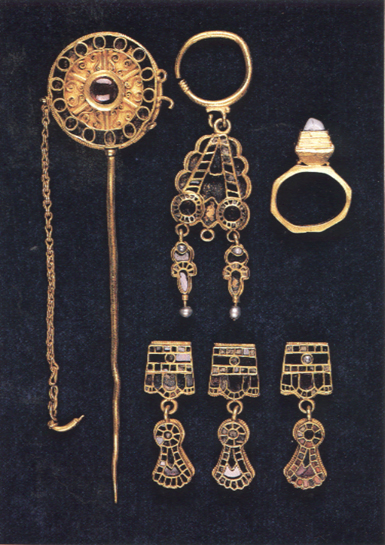Mary Scott Head
12/16/13
G Block
Architecture
Architecture played a very important role in both the Islamic and Byzantine Empires. Architecture was more than just constructing a building that would withstand weather and, was a comfortable living, and worshipping area. Architecture was considered art and was taken very seriously. Many long hours were spent building with bare hands and very, very, minimal technology. Although both empires put great thought and appreciation into architecture, there were many differences in the styles and meaning behind each building.
lslamic architecture was taken into deep thought and was extremely important in religious sites. Although the buildings of Islam were extremely detailed and beautiful, they were usually not very colorful. White, tan, gold, brown, and black were mostly used due to the shortage or color choice. Characteristics of Islamic architecture can be seen in the Great Mosque of Kairouan, located in Kairouan,Tunisia. It has been built and rebuilt twice. The first mosque was built by a man named Sidi Oqba in 670. His name is also a name of the mosque. The mosque was rebuilt in 863 by Emir Abou Ibrahim Ahmad, which still remains standing. On the outside, it may just look like a large oddly shaped building. Once you step inside, it is anything but ordinary. The mosque is equipped with a large marble floored courtyard which is sloped to force water flow to the center where it drains. Surrounding the courtyard are roughly 400 pillars that were used in Latin Christian, and Roman Byzantine buildings. Traces of these former uses can be seen throughout the courtyard. Wood carvings were also not a rare thing to see. Seats were carved priests out of a wood by the name of “indian teak”. It was used because of its durability and smooth finish. Also, the mosque was home too tombs of local saints. To enter the mosque, it was a must to be properly dressed. If the guards thought you not to be, robes were available to those poorly dressed. The mosque only allowed Muslims inside. Non-muslims were only allowed to have a peak inside. Islamic architecture may be extremely fascinating and meaningful, but Byzantine architecture is just as much, if not more beautiful.

Great Mosque Picture
Byzantine architecture is well known for its beauty and religious meaning. One of the most well known, and best representations of Byzantine architecture is the Hagia Sophia located in Istanbul. Also known as the Church of Holy Wisdom. The Hagia Sophia was built in a short 5 years as a church. You wouldn't be able to tell by looking at it. Its inside is covered with beautiful, hand crafted mosaics that each told a different story. Marble pillars line the halls throughout the building. The base of the building is an octagon shape with a large atrium and many additional smaller rooms. A beautiful large dome sits at the top of the building with pendentives supporting it. Light enters the dome and creates a beautiful effect inside. Domes were also very popular in Islamic architecture.
After Hagia Sophia was a church, it was transformed into a mosque from 1453-1935. Today, it remains as a museum. All worshiping activity is no longer aloud. Overall, Hagia Sophia is a beautiful masterpiece by the Byzantines. Today it is still considered the most beautiful building they built.
Importance of architecture
a. Religious importances
b. Different styles
2) Islamic architecture
1. a. religious uses
b. Traits of Islamic architecture
2. Great Mosque of Kairouan
a.History of the mosque
b. Mosque features
3) Byzantine architecture
1. a. traits of Byzantine architecture
2. Hagia Sophia
a. Building of the church
b. Mosaics
c. Mosque interior features
d. Hagia Sophia today
4) Islamic and Byzantine architecture are both significant.
a. Restatement of Islamic traits
b. Restatement of Byzantine traits
c. Similarities
d. differences
Bibliography
"Hagia Sophia." Dome -. Hagia Sophia, n.d. Web. 14 Dec. 2013. <http://www.hagiasophia.com/listingview.php?listingID=21>.
3. “Byzantine Architecture” Anthony, Rashan, William, . N.p.. Web. 13 Dec 2013. <http://library.thinkquest.org/C005594/Medieval/byzantine.htm>.
4. “The Byzantine Empire” Roger B. Beck, . <http://my.hrw.com/tabnav/controller.jsp?isbn=9780547521084>.
5. Ben Mama, Mohamed Beji. "Great Mosque of Kairouan." Www.DiscoverIslamicart.org. MWNF, 2004. Web. 16 Dec. 2013. <http://www.discoverislamicart.org/database_item.php?id=monument;ISL;tn;Mon01;2;en>.
6. "Islamic Architecture | Real Virtual | Columbia University in the City of New York." Islamic Architecture | Real Virtual | Columbia University in the City of New York. N.p., n.d. Web. 15 Dec. 2013. <http://www.learn.columbia.edu/ha/html/islamic.html>.
7. Hays, Holly. "Sacred Destinations." Great Mosque of Kairouan. N.p., 4 Nov. 2010. Web. 17 Dec. 2013. <http://www.sacred-destinations.com/tunisia/kairouan-great-mosque>.
8.Rautman, Marcus Louis. "Architecture." Daily Life in the Byzantine Empire. Westport, CT: Greenwood, 2006. 270-76. Print.
http://www.teslasociety.com/pictures/Roman%20Empire%20Images/RomanEmpire3.jpg






